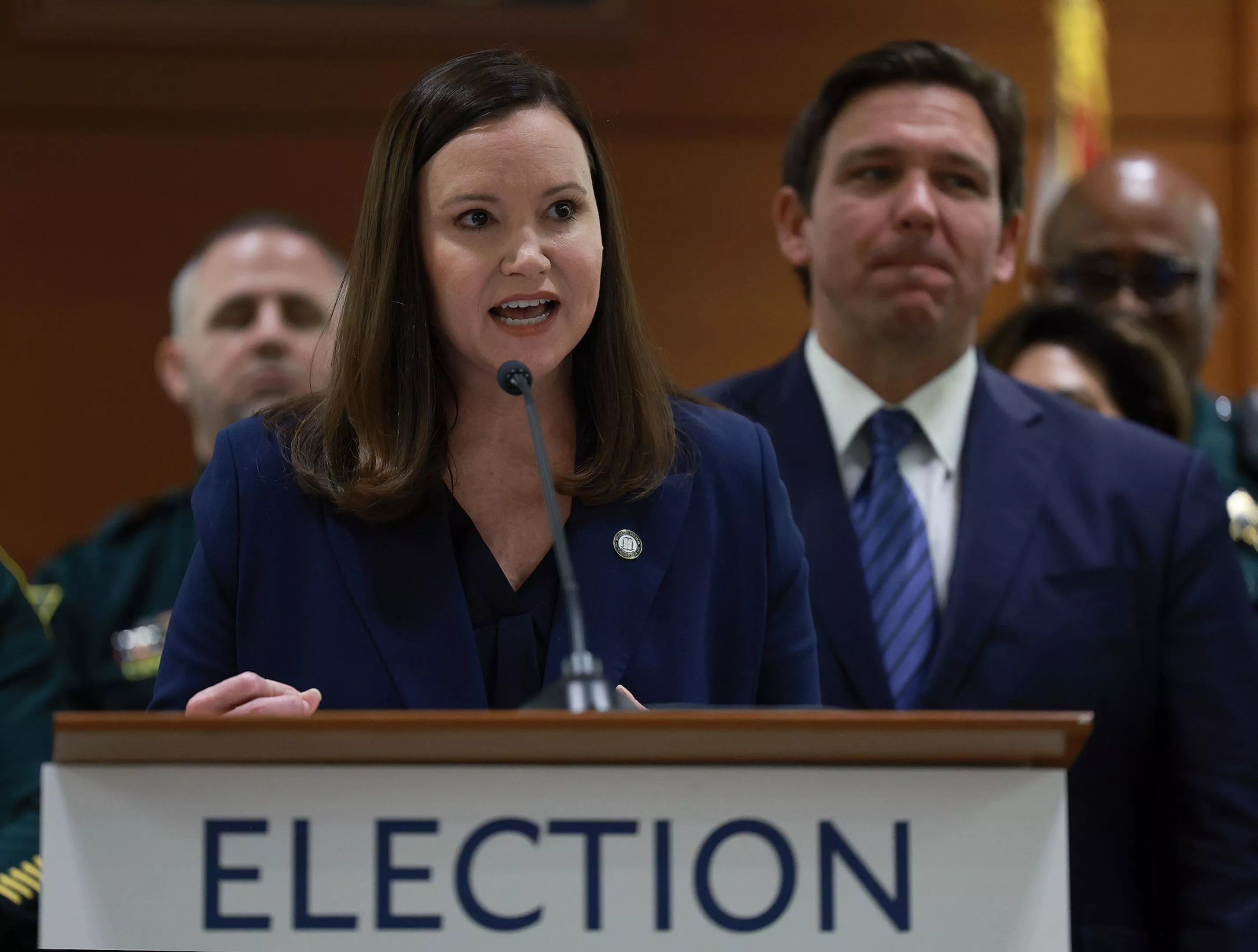
Photo by Anton Petrus/Getty Images

Audio By Carbonatix
In a promising sign for cannabis advocates, the Florida Supreme Court expressed skepticism and bewilderment over Attorney General Ashley Moody’s argument that a citizen initiative to legalize recreational marijuana should not be put to voters during next year’s general election because its wording is “misleading.”
Moody is seeking a ruling from the state’s highest court on the grounds that, as written, the initiative leads one to believe they are voting to legalize marijuana at the federal level when that is not the case. Thus, she argues, it would “subject users to devastating criminal liability under federal law.”
But Moody’s line of reasoning fell flat during last week’s oral arguments when presented by Chief Deputy Solicitor General Jeffrey Paul DeSousa of the Florida Attorney General’s Office.
“It says it does not immunize violations of federal law,” Justice Charles T. Canady said, holding up a copy of the 74-word initiative drafted by Smart & Safe Florida, a group funded by Florida-based medical marijuana giant Trulieve that poured more than $40 million to garner more than a million signatures to put the issue to voters. “[I don’t know] how a voter can be confused by that. I’m baffled by the argument.”
Also baffled was Justice John D. Couriel, a 2020 appointee of Gov. Ron DeSantis.
“[In 2021] we agreed with that argument because the ball was hidden,” he said, referring to the Supreme Court’s rejection of a previous petition on the basis that it was misleading.
“Where’s the hidden ball [here]? It says on the face of this that it applies to Florida law.”
Moody’s office also contends that the initiative violates the Florida Constitution’s so-called single-subject rule because it simultaneously legalizes recreational sales and authorizes existing medical marijuana dispensaries to sell the product.
The judges didn’t seem swayed by that argument either.
“Allowing the possession and then setting up a scheme for how it’s actually going to be obtained by people, I don’t see how that’s not directly connected,” said Chief Justice Carlos G. Muniz, who was appointed by DeSantis in 2019.
Judge Canady, a longtime skeptic of legal marijuana who dissented against the 2014 medical marijuana initiative that reached the ballot only to be defeated by voters (but eventually approved two years later), said Moody’s office was “turning the single-subject requirement not into anything other than a straitjacket on the people.”

Florida Attorney General Ashley Moody is fighting the citizen initiative to legalize recreational marijuana in the state.
Photo by Joe Raedle/Getty Images
“Phase One of the Fight”
The response from the court was refreshing to advocates in light of the fact that all three of the abovementioned Republican judges rejected similar measures in 2021 from groups called Make It Legal Florida and Sensible Florida to place recreational marijuana on the ballot after agreeing with Moody’s argument the initiatives were misleading.
“Some of the judges that I had concerns about called out the state for making weak arguments,” Christopher Cano, who sits on the board of directors of the National Organization for the Reform of Marijuana Laws (NORML) and cofounded the group’s Suncoast chapter, tells New Times. “The amendment itself is pretty cut-and-dry, so they don’t have much of a case to argue about the merits of the amendment passing any type of legal or constitutional standard.”
It might take months for the Supreme Court to render a ruling, and the real battle has yet to begin, says Brady Cobb, CEO of Sunburn Dispensary and an attorney licensed to practice in Florida.
“This is just phase one of the fight,” Cobb tells New Times. “If the court says it can go on the ballot, then the real battle’s going to heat up because special-interest money is going to pour in from the outside to try to fight it.”
“The state of Florida is trying to knock off any type of citizen initiatives for being on the ballot because they’re afraid of what the effects are going to be when it comes to voter turnout.”
Cobb notes that the Supreme Court rejected the last petition because it violated the single-subject rule by including legalization as well as the right for citizens to grow their own cannabis.
“As a company, we’ve always supported home grow, but from a pure constitutional law standpoint, I think the sponsors of the current amendment were smart enough to have read that previous order and realized that the single subject was the issue and were able to craft the new one so that it didn’t fall into that same trap.”
NORML’s Cano points out an existing citizen initiative to allow medical marijuana patients and caregivers to home-grow cannabis for medicinal purposes put forth by a group called WISE & Free Florida. That petition has received only a fraction of the signatures logged by the Smart & Safe Florida initiative.
“You’d be surprised what you can do when you put money behind something,” says Cano.
“Voter Suppression”
It’s impossible to calculate how many tax dollars the state has spent over the years to defeat the will of the people. (A recent poll found that 60 percent of Floridians approve of legalizing marijuana for recreational use.)
Cano is quick to point out that the attorney general also wants the Supreme Court to reject an abortion initiative put forth by an umbrella group called Floridians Protecting Freedom. That petition has gathered nearly 500,000 of the required 891,523 signatures ahead of a February 1 deadline to put the issue on the 2024 ballot.
“The state of Florida, under the direction of Ashley Moody as attorney general, is essentially trying to knock off any type of citizen initiatives for being on the ballot because they’re afraid of what the effects are going to be when it comes to voter turnout,” Cano says.
In other words, they’re afraid of issues that motivate Democrats to go to the polls.
“Put it like this: If both abortion and marijuana are on the ballot in Florida, just like they were on Tuesday night [November 7] in Ohio, you can best believe that there are going to be certain Republicans that are going to lose,” says Cano. “And Ron DeSantis does not want to be in that ‘L’ category, especially if he happens to be the Republican nominee for president.”
Melba Pearson, a civil rights and criminal law attorney who unsuccessfully ran against incumbent Miami-Dade State Attorney Katherine Fernandez-Rundle in 2020 and who currently works at Florida International University’s Jack D. Gordon Institute for Public Policy, sums up Moody’s maneuvering as “another form of voter suppression. They looked at the polling numbers, and they know that Floridians overwhelmingly support both of these types of measures, so they’re doing everything they can to make sure that the average Floridian does not have a voice in this.”
Though Ohio’s was an off-year election and Florida is staring down the barrel of 2024, Pearson sees a lesson for voters in the Sunshine State.
“That was the people speaking [in Ohio],” she says. “So that’s the lesson that we as Floridians need to learn: that we need to turn out each and every election, hold our elected officials accountable, and make sure that we’re shaping the state in a manner that’s consistent with our values.”